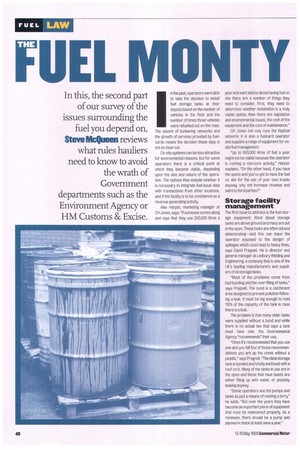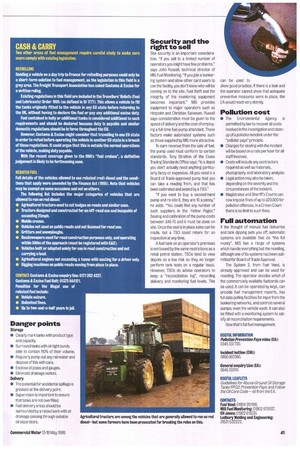FUEL MONTY
Page 42

Page 43

If you've noticed an error in this article please click here to report it so we can fix it.
In this, the second part of our survey of the issues surrounding the fuel you depend on,
Steve McQueen reviews what rules hauliers need to know to avoid the wrath of Government departments such as the Environment Agency or HM Customs & Excise.
III n the past, operators were able to take the deo sion to install fuel storage tanks at their depots based on the number of vehicles in the fleet and the number of times those vehicles were refuelled out on the road.
The advent of bunkering networks and the growth of services provided by fuelcards means the decision these days is not so clear-cut.
On-site systems can be less attractive for environmental reasons, but for some operators there is a critical point at which they become viable, depending upon the size and nature of the operation. The options then include whether it is necessary to integrate fuel-issue data with transactions from other locations, and if the facility is to be considered as a revenue-generating activity Alex Harper, marketing manager at CH Jones, says: "If someone comes along and says that they use 250,000 litres a year and want advice about having fuel on site there are a number of things they need to consider. First, they need to determine whether installation is a truly viable option; then there are legislation and environmental issues, the cost of the equipment and the cost of maintenance."
CH Jones not only runs the Keyfuel network; it is also a fuelcard operator and supplies a range of equipment for onsite fuel management "Up to 500,000 litres of fuel a year might not be viable because the operator is running a non-core activity" Harper explains. "On the other hand, tf you have the space and you've got to have the fuel on site for the use of your own trucks anyway, why not increase revenue and sell it to third parties?"
Storage facility management
The first issue to address is the fuel storage equipment. Most diesel storage tanks are above ground and many are out in the open. These tanks are often old and deteriorating—and this can leave the operator exposed to the danger of spillages which could lead to heavy fines, says David Pragnell. He is director and general manager at Ledbury Welding and Engineering, a company that is one of the UK's leading manufacturers and suppliers of oil storage tanks.
"Most of the problems come from bad bunding and the over-filling of tanks," says Pragnell. The bund is a catchment area designed to prevent pollution following a leak. It must be big enough to hold 110% of the capacity of the tank in case there is a leak.
The problem is that many older tanks were supplied without a bund and while there is no actual law that says a tank must have one. the Environmental Agency "recommends" their use.
"Once it's recommended that you use one and you fall foul of those recommendations you are up the creek without a paddle," says Pragnell. "The ideal storage tank is Ounded and totally enclosed with a roof on it. Many of the tanks in use are in the open and those that have bunds are either filling up with water, or possibly leaking anyway
Some operators see the pumps and tanks as just a means of running a lorry," he adds. "But over the years they have become an important piece of equipment that must be maintained properly. As a minimum, there should be a pump and pipework check at least once a year."
CASH It CARRY
Two other areas of fuel management require careful study to make sure users comply with existing legislation.
REFUELLING Sending a vehicle on a day trip to France for refuelling purposes could only be a short-term solution to fuel management, as the legislation in this field is a grey area. The Freight Transport Association has asked Customs & Excise for a written ruling.
Existing regulations in this field are included in the Travellers Reliefs (Fuel and Lubricants) Order 1995 (as defined in SI 1777). This allows a vehicle to fill the tanks originally fitted to the vehicle in any EU state before returning to the UK, without having to declare the fuel or pay any additional excise duty.
Fuel contained in belly or additional tanks is considered additional to such requirements and should be declared because duty Is payable and similar domestic regulations should be in force throughout the EU.
However, Customs & Excise might consider that travelling to one EU state in order to refuel before operating the vehicle in another EU state is a breech of these regulations. It could argue that this is outside the normal operations of the vehicle, making duty payable.
With the recent coverage given to the RHA's "fuel cruises", a definitive judgement is likely to be forthcoming soon.
flEBATED FUEL
Full details of the vehicles allowed to use rebated (red) diesel and the conditions that apply were amended by the Finance Act (1995). Note that vehicles may be exempt on some occasions and not on others.
The following list includes the major categories of vehicles that are allowed to run on red diesel: • Agricultural tractors used to cut hedges on roads and similar uses.
• Tractors designed and constructed for on/off-road use and incapable of exceeding 25mph.
• Mobile cranes.
• Vehicles not used on public roads and not licensed for road use.
• Critters and snowploughs.
• Roadsweepers used for road construction purposes only, and operating within 500m of the approach (must be registered with C&E).
• Vehicles built or adapted solely for use in road construction and not carrying a load.
• Agricultural engines not exceeding a tonne with seating for a driver only.
• Digging machines on public roads moving from place to place.
CONTACT: Customs & Excise enquiry line: 0171 202 4227. Customs & Excise Fuel Unit: 01375 844121. Penalties for the illegal use of rebated fuel include:
• Vehide seizure.
• Unlimited fines.
• Up to two-and-a-half years in jail.
Danger points
Storage
• Clearly mark tanks with product type and capacity.
• Surround tanks with oil-tight bunds able to contain 110% of their volume.
• Regularly pump out any rainwater and dispose of this with care.
• Enclose all pipes and gauges.
• Eliminate drainage outlets. DeNvory • The potential for accidental spillage is greatest at the delivery point.
• Supervision is important to ensure that tanks are not overfilled.
• Fuel delivery areas should be surrounded by a raised kerb with all
Security and the right to sell
Site security is an important consideration. if you sell to a limited number of operators you might have few problems,' says John Russell, technical director of MIS Fuel Monitoring. "If you join a bunkering system and allow other card users to use the facility, you don't know who will be coming on to the site. Fuel theft and the integrity of the monitoring equipment becomes important." MIS provides equipment to major operators such as Hotpoint and Christian Salvesen. Russell says consideration must be given to the speed of delivery and the cost of employing a full-time fuel-pump attendant. These factors make automated systems such as those supplied by MIS more attractive.
To earn revenue from the sale of fuel, the pump used must conform to certain standards. Tony Stratton of the Essex Trading Standards Office says: "In a depot you don't actually need anything particularly fancy or expensive. All you need is a Board of Trade-approved pump that you can take a reading from, and that has been calibrated and sealed by a ISO."
"If you want to buy a second-hand pump and re-site it, they are 10 a penny," he adds. "You could find any number of such suppliers in the Yellow Pages." Sealing and calibration of the pump costs between £45-70 and it must be done on site. Once the seal is in place sales can be made, but a TS0 could return for an inspection at any time.
A fuel tank an an operator's premises is not bound by the same restrictions as a retail petrol station. TSOs tend to view depots as a low risk so they no longer perform tank tests on a regular basis. However, TSOs do advise operators to keep a "reconciliation log", recording delivery and monitoring fuel levels. This can be used to show good practice. if there is a leak and the operator cannot show that adequate preventive measures were in place, the EA would react very sternly.
Pollution cost
• The Environmental Agency is permitted by law to recover all costs involved in the investigation and cleanup of a pollution incident under the "polluter pays" principle.
• Charges for dealing with the incident will be based on a rate per hour for all staff involved.
• Costs will include any contractors required as well as materials, photography and laboratory analysis.
• Legal action may also be taken, depending on the severity and the circumstances of the incident.
• Magistrates and Sheriff's Courts can now impose fines of up to £20,000 for pollution offences. In a Crown Court there is no limit to such fines.
Full automation
If the thought of manual fuel deliveries and tank dipping puts you off, automatic systems are available that do "the full monty". MIS has a range of systems which handle everything but the reselling, although one of its systems has been submitted for Board of Trade Approval.
The System 2, from Fuel Vend, is already approved and can be used for reselling. The operator decides which of the commercially available fuelcards can be used. It can be operated by keys, can provide fuel management reports, has full data polling facilities for input from the bunkering networks, and controls several pumps; even the vehicle wash. It can also be fitted with a monitoring system to satisfy all reconciliation requirements.
Now that's full fuel management.
USEFUL INFORMATION
Pollution Prevention Pays video (EA): 0345 337700.
Incident hotline (EVA): 0800 807060.
General enquiry Line (EA): 0645 333111.
USEFUL LEAFLETS Guidelines for Above-Ground Oil Storage Tanks PPG2 Prevention Pays, and Follow the Oil Care Code—all from the EA.
CONTACTS
Fuel Vend: 01924 291919,
MIS Fuel Monitoring: 01902 870037.
CH Jones: 01922 615231.
Ledbury Welding and Engineering:
01531 632222.
















































































































